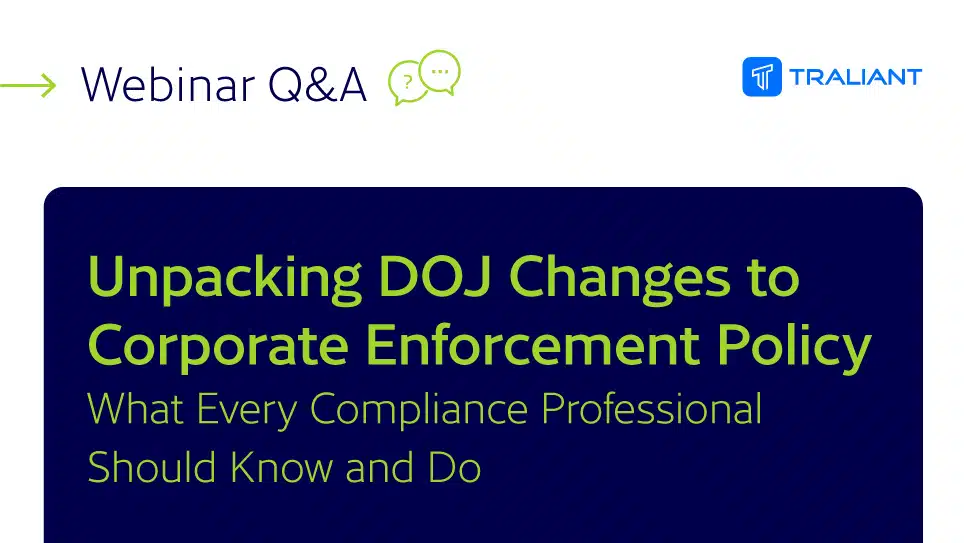
Protecting People and Productivity: Harassment Prevention in Manufacturing
Harassment Prevention


Maria D’Avanzo, Traliant Chief Evangelist Officer, addresses what the flurry of DOJ enforcement announcements in March mean for organizations, their leadership and compliance programs. A series of new Department of Justice announcements in March is evidence of its increasingly tough approach to corporate crime and emphasis on rewarding companies that have effective compliance programs and […]

A series of new Department of Justice announcements in March is evidence of its increasingly tough approach to corporate crime and emphasis on rewarding companies that have effective compliance programs and penalizing those that do not.
Traliant helped listeners sort through the recent changes to DOJ policies and guidance during a free webinar on March 16, entitled: “Unpacking DOJ Changes to Corporate Enforcement Policy: What Every Compliance Professional Should Know and Do.” During the 45-minute webinar, Maria D’Avanzo, Chief Evangelist Officer at Traliant, attorney and a former Chief Ethics and Compliance Officer addressed:
Below are some of the questions covered during the 45-minute webinar.
The new DOJ announcements build on the “Monico Memo,” which significantly revised the DOJ’s corporate criminal enforcement policies and procedures, including putting a renewed focus on individual accountability and placing stricter requirements on corporate cooperation credit for prompt self-disclosure.
The memo announced the first-ever Department-wide guidance on evaluating a corporation’s compensation plans and instructed the Criminal Division “to develop further guidance by the end of the year on how to reward corporations that develop and apply compensation clawback policies.”
It also noted that “prosecutors should consider whether the corporation has implemented effective policies and procedures governing the use of personal devices and third-party messaging platforms to ensure that business-related electronic data and communications are preserved.”
When evaluating the effectiveness of your compliance program, ask these 3 fundamental questions:
Use the DOJ’s 2023 Evaluation of Corporation Compliance Programs document to compare your program against its hallmarks. Are you measuring effectiveness? Are you giving employees an opportunity to ask questions? Are you training them regularly? Are you providing employees who pose a particular type of risk with special training? These are some of the specific questions in the document that a prosecutor would ask. If you can’t adequately answer a question, you’ve identified a gap in your program that you need to address. Document how you mitigate the gap so that if you ever find yourself in front of the DOJ, you can say you went through a good faith effort to assess your program and used its guidance to do it.
Changes to DOJ enforcement policy are designed to make companies focus on avoiding misconduct before it happens. Steps your C-Suite can take to do this include:
Click here to listen to an on-demand replay of Traliant’s webinar “Unpacking DOJ Changes to Corporate Enforcement Policy: What Every Compliance Professional Should Know and Do.”